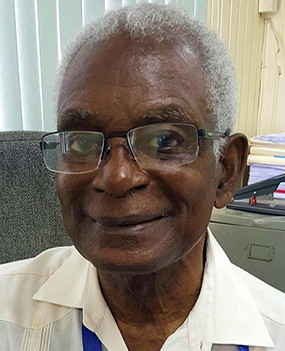Two months after former government advisor on petroleum, Dr Jan Mangal called for an investigation into the awards of oil blocks near to Exxon-Mobil’s Stabroek Block, Director of the State Assets Recovery Agency (SARA), Professor Clive Thomas has revealed that such a probe is underway.
He made this disclosure in a recent interview with the New York-headquartered Bloomberg News. Stabroek News was unable to contact Thomas yesterday for a comment on the investigation.
“We’re investigating the issuance of the licenses, for example, and the various blocks,” Thomas was quoted as saying in an article published yesterday. “We’re building up a case. This is an area of investigation into how the blocks were allocated and the decisions that were made,” he further said. Based on Thomas’ comments SARA will be looking beyond the blocks awarded to Exxon. Aside from the Stabroek, Kaieteur and Canje which Exxon has control over, Orinduik block which Tullow Oil Plc signed up to explore in 2016 will also be investigated.
According to the article, SARA is investigating how exploration rights were awarded in an area now controlled by the two companies.
Mangal in pointing out that the oil blocks near to ExxonMobil’s Stabroek Block were awarded shortly before the 2015 general elections said that he believes persons knew of the company’s oil find and acted to capitalise on securing nearby blocks.
In interviews with Stabroek News, former president Donald Ramotar has however maintained that he had no knowledge of ExxonMobil’s oil find in the Stabroek Block before the 2015 general elections and therefore his award of contracts to private companies shortly before should not be seen as questionable.
He maintained too that his actions were guided by then Minister of Natural Resources Robert Persaud’s recommendations that offshore oil blocks near ExxonMobil’s Stabroek Block be awarded just days before the May 11th, 2015 general elections.
The companies that were awarded concessions were Ratio Oil, JHI and Mid-Atlantic Oil and Gas Inc.
According to Bloomberg, Thomas said that there is “enough evidence for us to want to continue the investigation.” He said that give that SARA is at an investigatory stage “we can’t libel persons by saying that we found proof of anything.”
It was stated that one particular area of focus for Thomas’ team involves the 2015 general election, when the Canje and Kaieteur blocks were awarded to a group of junior exploration companies. Exxon was not among the initial investors but bought stakes in both blocks a year later and became operator. The Stabroek Block was initially awarded in 1999 and its Production Sharing Agreement renegotiated in 2016.
Vague response
“I was not given any other information, just a vague response about a week before the election, from Exxon. The impression I got was they were not ready to make the announcement because they were not clear but that it just looks good. They were not very explicit with me,” Ramotar had told this newspaper.
Asked if he had spoken to Persaud, who resigned from politics when Ramotar lost those elections or if he felt that Persaud should explain the rationale behind the advice given, the former president would only say that “the buck stopped with me.”
Ramotar has previously acknowledged that oil exploration agreements he signed with two start-up private operators within the two-week period in the run up to the last general elections did look “suspicious,” but he maintained that there was nothing sinister in the deals.
“I know it looks suspicious but I thought we would have won the elections anyhow and that it was just the continuation of an already started process from 2013,” he had told this newspaper last year.
Mangal raised the issue in a Facebook post.
He expressed belief that after striking oil, ExxonMobil was strategic in getting the other nearby blocks off the market at a cheap cost, thereby resulting in the awards. He has said that the matter requires an investigation as this country may have possibly lost billions of US dollars by what he called “secret awards” and that he is at a loss as to why the current APNU+AFC government has not taken up the issue.
“Another much more important issue for Guyanese people is the highly anomalous awards of the Kaieteur and Canje oil blocks by the former Minister of Natural Resources, Mr. Robert Persaud…,” Mangal wrote.
During an interview in March last year, Thomas had pointed out that the agency was preparing to play its role in safeguarding the state’s property when oil production begins. He had told Stabroek News that the agency wants to establish a department or section that deals primarily with the oil industry. “…you know all the complaints we are getting and the discussions in the press…We as an agency, are well-positioned to investigate such matters so we are hoping that somewhere down the line, maybe another year or so, we can develop that,” Thomas had said.
He had asserted that oil has become an important sector because of the amount of state assets that would be involved, particularly given that “we own the industry and Exxon is the contractor so that we would have to protect the national property as much as we can.”










